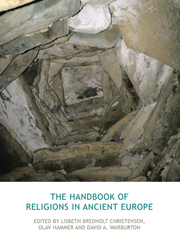Book contents
- Frontmatter
- Contents
- A note on Greek and Latin sources
- Abbreviations and short titles
- 1 Introduction
- PART I PREHISTORIC RELIGIONS
- 2 Studying prehistoric religions
- 3 Prehistoric material and religion: a personal odyssey
- 4 Francesco d'Errico and the origins of religion
- 5 On Palaeolithic religion
- 6 Ian Hodder and the Neolithic
- 7 Neolithic cult images? The testimony of figurines for Neolithic religion
- 8 Religious practices in northern Europe 4000–2000 BCE
- 9 Mythological aspects of Nordic Bronze Age religion
- 10 Religion and society in the Bronze Age
- 11 The religions of prehistoric Europe and the study of prehistoric religion
- PART II ANCIENT EUROPE IN THE HISTORICAL PERIOD
- Timeline of key dates
- Contributors
- References
- Index
4 - Francesco d'Errico and the origins of religion
from PART I - PREHISTORIC RELIGIONS
- Frontmatter
- Contents
- A note on Greek and Latin sources
- Abbreviations and short titles
- 1 Introduction
- PART I PREHISTORIC RELIGIONS
- 2 Studying prehistoric religions
- 3 Prehistoric material and religion: a personal odyssey
- 4 Francesco d'Errico and the origins of religion
- 5 On Palaeolithic religion
- 6 Ian Hodder and the Neolithic
- 7 Neolithic cult images? The testimony of figurines for Neolithic religion
- 8 Religious practices in northern Europe 4000–2000 BCE
- 9 Mythological aspects of Nordic Bronze Age religion
- 10 Religion and society in the Bronze Age
- 11 The religions of prehistoric Europe and the study of prehistoric religion
- PART II ANCIENT EUROPE IN THE HISTORICAL PERIOD
- Timeline of key dates
- Contributors
- References
- Index
Summary
Francesco d'Errico is a researcher at the French National Centre for Scientific Research (CNRS) in Bordeaux. The Palaeolithic is his main field of research, and one of his major interests is investigating the origins of human cognition. D'Errico's research is directly related to the origins and development of those forms of symbolic expression which would ultimately come to typify religion, at least in so far as religion can be seen in material culture. Owing to fieldwork commitments he was unable to submit a chapter to the present volume, and thus I have tried to summarize what I view as part of the relevant details of his work. He looked at a preliminary version and concluded that it was my work, not his. I would not disagree with him, but stress that that was not my object: he is aiming to present methods and results to archaeologists and scientists; I aim to present ideas to students of religion. My concern has been with using a couple of examples from his broad and multi-faceted work, distilling the valid conclusions about what can be interpreted, and discarding the archaeological debate about dubious or controversial elements.
To illustrate his work, I take what I view as some of his most important projects: an in-depth study of one of the oldest human figures ever found, the discovery of the simultaneous use of red colouring on cowry shells, and a summary of the evidence concerning early religious practices.
- Type
- Chapter
- Information
- The Handbook of Religions in Ancient Europe , pp. 30 - 35Publisher: Acumen PublishingPrint publication year: 2013



